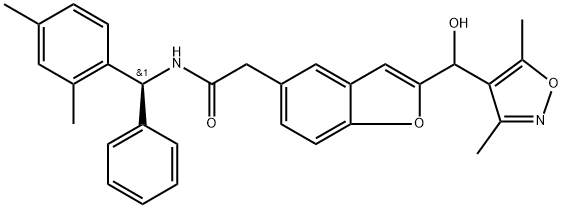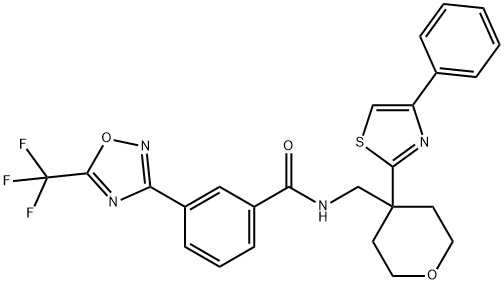TMP778
- CAS NO.:1422171-08-1
- Empirical Formula: C31H30N2O4
- Molecular Weight: 494.59
- MDL number: MFCD32220463
- Update Date: 2024-11-19 20:33:22

What is TMP778?
Description
TMP778 is a potent and selevtive RORγt inverse agonist, with an IC50 of 7 nM in FRET assay.
It is found that TMP778 at >2.5 μM starts to show toxic effects on cell growth, which however is not RORγt-dependent, since the proliferation of RORγt-deficient T cells cultured under Th17 cell-polarizing conditions is also decreased. Otherwise, these inhibitors do not show inhibitory effects on cell proliferation or RORγt expression or its nuclear translocation, but efficiently inhibited IL-17 production. TMP778 has a much broader dose range and efficiently decreased IL-17 production, consistent with its higher binding affinity for RORγt. These data indicate that TMP778 is the RORγt inhibitor that most potently reduced IL-17 production[2].
All three compounds (e.g., TMP778) delay the onset of disease and substantially reduce the severity of disease progression compared to control-treated mice. Consistent with in vitro results, TMP778 treatment causes the most pronounced effect on the disease phenotype. This treatment not only decreases the number of mononuclear cells infiltrating the central nervous system (CNS), but also most strongly reduces the percentage of IL-17+ T cells in the CNS (including IL-17+ IFNγ+). There is no significant change in the percentage IFNγ+ IL-17-T cells in the CNS among all groups, indicating that none of the inhibitors affects Th1 responses. TMP778 strongly inhibits Th17 cell generation, reduces IL-17 production from differentiated Th17 cells, and also dramatically ameliorates the progression of EAE[2].
References
[1]. Skepner J, et al. Pharmacologic inhibition of RORγt regulates Th17 signature gene expression and suppresses cutaneous inflammation in vivo. J Immunol. 2014 Mar 15;192(6):2564-75. [2]. Xiao S, et al. Small-molecule RORγt antagonists inhibit T helper 17 cell transcriptional network by divergent mechanisms. Immunity. 2014 Apr 17;40(4):477-89.
Properties of TMP778
| Boiling point: | 752.7±60.0 °C(Predicted) |
| Density | 1?+-.0.06 g/cm3(Predicted) |
| storage temp. | Store at -20°C |
| solubility | Soluble in DMSO |
| pka | 12.47±0.20(Predicted) |
Safety information for TMP778
Computed Descriptors for TMP778
New Products
(S)-3-Aminobutanenitrile hydrochloride 4-Methylphenylacetic acid N-Boc-D-alaninol N-BOC-D/L-ALANINOL Tert-butyl bis(2-chloroethyl)carbamate 3-Morpholino-1-(4-nitrophenyl)-5,6-dihydropyridin- 2(1H)-one Furan-2,5-Dicarboxylic Acid Tropic acid 1-Bromo-3,5-Di-Tert-Butylbenzene S-2-CHLORO PROPIONIC ACID ETHYL ISOCYANOACETATE 2-Bromo-1,3-Bis(Dimethylamino)Trimethinium Hexafluorophosphate 4-IODO BENZOIC ACID 3-NITRO-2-METHYL ANILINE 1-(2,4-DICHLOROPHENYL) ETHANAMINE (2-Hydroxyphenyl)acetonitrile 4-Bromopyrazole 2-(Cyanocyclohexyl)acetic acid 4-methoxy-3,5-dinitropyridine 1-(4-(aminomethyl)benzyl)urea hydrochloride 2-aminopropyl benzoate hydrochloride diethyl 2-(2-((tertbutoxycarbonyl)amino) ethyl)malonate tert-butyl 4- (ureidomethyl)benzylcarbamate Ethyl-2-chloro((4-methoxyphenyl)hydrazono)acetateRelated products of tetrahydrofuran
![N-[2-Methyl-2-(2-phenyloxazol-4-yl)propyl]-3-[5-(trifluoroMethyl)-1,2,4-oxadiazol-3-yl]benzaMide](https://img.chemicalbook.in/CAS/20150408/GIF/1314891-22-9.gif)

You may like
-
 2033-24-1 98%View Details
2033-24-1 98%View Details
2033-24-1 -
 42831-50-5 5-METHYLISOXAZOLE-4-CARBOXYLIC ACID 98%View Details
42831-50-5 5-METHYLISOXAZOLE-4-CARBOXYLIC ACID 98%View Details
42831-50-5 -
 1975-50-4 98%View Details
1975-50-4 98%View Details
1975-50-4 -
 2-HYDROXY BENZYL ALCOHOL 98%View Details
2-HYDROXY BENZYL ALCOHOL 98%View Details
90-01-7 -
 2-Chloro-1,3-Bis(Dimethylamino)Trimethinium Hexafluorophosphate 221615-75-4 98%View Details
2-Chloro-1,3-Bis(Dimethylamino)Trimethinium Hexafluorophosphate 221615-75-4 98%View Details
221615-75-4 -
 61397-56-6 CIS BROMO BENZOATE 98%View Details
61397-56-6 CIS BROMO BENZOATE 98%View Details
61397-56-6 -
 14714-50-2 (2-Hydroxyphenyl)acetonitrile 98+View Details
14714-50-2 (2-Hydroxyphenyl)acetonitrile 98+View Details
14714-50-2 -
 118753-70-1 98+View Details
118753-70-1 98+View Details
118753-70-1